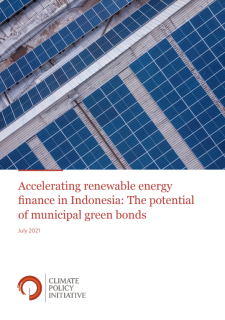
Indonesia reallocated its 2020 fiscal budget for healthcare, social assistance and small businesses to cushion the negative impacts of the COVID-19 pandemic. This reallocation consequentially reduced the fiscal capacity of local governments to finance long-term climate goals. Among other impacts, the reduced capacity is a potential threat to achieving Indonesia’s energy transition target - cities are a key component to the country's mandated National Energy Policy of reaching 23% renewable energy contribution in the energy mix by 2025.
In this paper, the Climate Policy Initiative (CPI) proposes the use of municipal bonds to support Indonesia’s energy transition targets and analyses the overall feasibility of implementing such bonds. It identifies three main factors that make a strong case for accelerating green bond issuance by municipal governments in Indonesia: the country's energy transition target; the existence of local governments with high fiscal capacity to issue bonds; and the rising appetite of the local governments to issue green bonds and the market to buy green bonds whenever sufficiently attractive.
The report also outlines the opportunities and challenges, both on the supply and demand side, and explores potential solutions to overcome the gaps in issuing municipal bonds.
